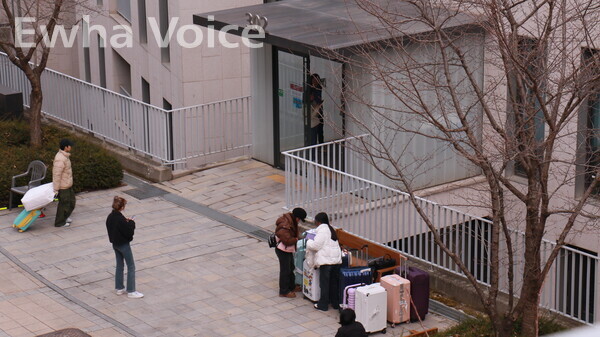
On Feb. 20, Ewha dormitories, housing over 4000 students, announced the implementation of a new penalty standard, following extensive discussions and consideration of the Human Rights Friendly Guidelines for Communal University Living.
Specific modifications made to the guidelines included a reduction of demerit points from three points to one point for staying out without the Housing Office’s permission. Moreover, students will only receive 0.5 demerit points when they return after midnight, which they were punished with two demerit points under the previous penalty standard.
Such changes were made as a result of extensive communication between the Housing Office and the Dormitory Student Council as well as longstanding concerns of dormitory officials. The Housing Office put in effort to make a decision that would satisfy most of the dormitory community, including residents and their parents.
Lee Sooyoung, a senior from the Department of Political Science & International Relations, had lived in E-House for two semesters, gave her take on the issue. She stressed that the problem with the curfew is not about demerits but rather the curfew hours itself.
“While I do understand the purpose of curfew, I do not think that it is necessary to strictly enforce it on students,” Lee said. “Most of us have commitments regardless of the hour.”
Lee recalled an unforgettable moment when she had an important club meeting and needed to attend a dinner with the members. She ended up missing the bus back to campus and decided to spend the night outside off Ewha, as returning to the dormitory would result in a demerit.
“Some plans are just unavoidable and sometimes unexpected inconveniences, such as missing the shuttle bus, can happen,” Lee explained. “Unfortunately, I am not the only one who experienced such issues, as I personally know other students who also underwent similar experiences.”
Despite the continued enforcement of the curfew hours, Lee still finds optimism in the reduced demerit points, suggesting that the dormitory should demonstrate leniency towards students encountering challenges in compliance due to inevitable circumstances.
However, Kim Jay, a sophomore from the Department of Computer Science and Engineering who lived in the dormitories during her freshman year, had a different opinion on the matter.
“I do not think there is much difference,” Kim mentioned. “You will get evicted if your total demerits are higher than 10 points, but I do not think that can happen often, even during the previous semester with the old guidelines.”
Kim thinks that the act of putting time restrictions on students itself is something that needs to be reconsidered with respect to one’s private life. She proceeded to give an example of her experience studying during the exam week.
“The Ewha Centennial Library has always been my most preferred place to study,” she said. “But having to leave the library by 11:30 p.m and rushing to the dormitory before midnight was an burdensome routine. I think extending the start of the curfew to 1 a.m would be more helpful rather than just reducing demerit points.”
Amid various opinions stirred up by the new curfew policy, the latest dormitory selection’s result has also been the subject of students’ discussions due to some dissatisfaction on the allocation’s outcome.
SoYeon Chung, the Housing Office director, who is a professor at the Department of Korean Language Education, explained the dormitory selection process.
“For fairness in the process, we utilize computers to randomly select dormitory residents,” Chung mentioned. “This means that there are no set standards including a student’s GPA or home address.”
However, students including those who have no home residence in Korea, students with disabilities, and foreign exchange students are excluded from the computer selection system so that they can be assigned a room on priority.
Other than prioritizing students with special needs, the Housing Office also put in efforts to make dormitory life pleasant and satisfying for students from different cultural and social backgrounds.
“For instance, we do not have curfew hours for students living in I-HOUSE as the majority are graduate students and foreign students who are not accustomed to curfews,” Chung said. “Some exchange students also struggle with jet lag, meaning that having a curfew might cause some inconvenience.”
Despite the efforts by the Housing Office to make selection fair, the process has naturally led to dissatisfaction among students unable to secure a spot in the dormitory.
Zahra Nabilla Putri, a sophomore from the Division of Communication & Media, is one of many students who must search for their own accommodation in consequence of not passing the selection process.
Putri expressed how she enjoyed living in the dormitory during her freshman year, which motivated her to apply once again. Despite numerous follow up emails to the Dormitory Administration Office, she has failed to secure a room as a result of tight competition.
“I assume I was prioritized for a spot in the dormitory as I was a foreign first-year student last year,” Putri expressed. “It would be great if the dormitory implements the same system to foreign students regardless of school year as it would allow more adequate accommodations.”
However, opinions may differ from one person to another. Kim Taeyoung, a student from the Department of Computer Science and Engineering, finds the allocation procedure somehow justified.
Regardless of Kim herself not being accepted into the dormitory, she expressed appreciation for the system on prioritizing students with special circumstances. For instance, she completely agreed with putting students with disabilities first to receive accommodation preference, ensuring their needs are suitably addressed within the university’s residential facilities.
The dormitory penalty guidelines and student selection process are always a topic of debate, but the Housing Office is always open to new opinions and concerns so that they can make changes and create a pleasant environment for students to live in.
“I hope the students realize that the dormitory officials are always by their side,” Chung said. “It would be best if students could inform us right away if faced with any inconvenience.”

